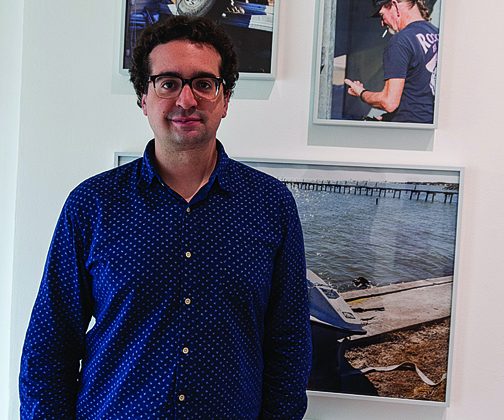“Rockport” at Spellerberg Projects explores climate change evidence
By Miles Smith
LPR Editor
On the surface, a striking collection of photos shot by Austin artist Elijah Barrett seem to be an editorial photo essay documenting the toll Hurricane Harvey took on Rockport, a community located near Corpus Christi, in 2017.
But Barrett, a 2009 Yale graduate with an art degree in photography, says there’s more than meets the eye to the collection of photos covering the walls of the Spellerberg Projects Gallery. There’s a message for those who care to see it.
Namely, climate change is real, and its effects are devastating, he said.
“Going through the photos, I found myself straining to block things out – whether they were from the sunlight, or the intensity of the colors – and it made me think, not being from that town, that we outsiders don’t really understand the cycle,” Barrett said. “We let the news cycle consume our attention with storms when they’re about to happen, and then the coverage of the wreckage, and then we forget about them.
“Suddenly, it felt more urgent to pay attention to these kinds of disasters. Certainly our role, society’s role, and how we are affecting climate. We have to stop the process of recognizing something and then letting it fall from view. We need to change our energy production and consumption and care for our vulnerable communities.”
Shortly after Harvey, Barrett had followed his wife, Claire, a Presbyterian minister, who was on a mission trip to help Corpus Christi-area communities affected by the storm. One day, armed with his camera, he headed to Rockport, an area he had heard was hit particularly hard by the storm.
What he saw took him two trips to photograph, and, really, two trips to fully process.
“I think, when you’re visiting a place that has been so severely damaged, a mix of emotions hits you,” Barrett said. “The lives in this community had really been turned upside down overnight. You see possessions strewn about and you start to really think about the people whose belongings were there. There’s the potential for lives to be disrupted forever.”
And then he was struck by the irony of the cycle of cleaning up and rebuilding. When one rebuilds these communities, they use heavy machinery and consume resources heavily, contributing to the conditions that are arguably causing global temperatures to rise and extreme weather patterns to intensify.
“A hurricane makes an immense pile of waste, making great piles of wreckage that need to be cleared away,” Barrett said. “If folks want to come back, what would be the cost to remake everything that had been destroyed. If the community is damaged, everything needs to be replaced. Perhaps we’re stuck in a feedback loop as far as creating more demands on energy and making even more climate change. That just stuck in my mind.”
To appreciate the images, one must stand in a room surrounded by them, Barrett said.
The exhibit at the Spellerberg gallery provides people with a chance to appreciate the message being conveyed, he said.
“It’s the first time I’ve been able to take this suite of images and show them in really close quarters,” Barrett said. “It’s not a place you can stand without having images in your peripheral vision. This is more of an immersive experience. You have the puzzle between the jet ski, and the portraits of damage … these wider landscapes. You have the images of a claw capturing wreckage and carrying it off. The account that emerges is one that is disorienting.
“That’s what is interesting about this show. It allows the entire work to be almost consumed at once.”
Barrett said he’d be delighted if his project inspired people to read more about the people who lost their homes, the community, or even about climate change in general.
“People are hungry for context, but the images don’t provide any answers,” Barrett said. “I hope people read for more context and hope that helps give greater strength and body to this project.”
The exhibit will be located at Spellerberg Projects at 103 S. Main St. through July.




